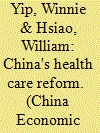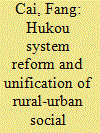| Srl | Item |
| 1 |
ID:
092526


|
|
|
|
|
| Publication |
2009.
|
| Summary/Abstract |
China has recently unveiled an ambitious new health-care reform plan, entailing a doubling of government health spending as well as a number of concrete reforms. While the details of the plan have not yet been completely announced, we offer a preliminary assessment of how well the reform is likely to achieve its stated goal of assuring every citizen equal access to affordable basic health care. The reform is based on three fundamental tenets: strong role of government in health, commitment to equity, and willingness to experiment with regulated market approaches. Within this framework, the reform offers a number of laudable changes to the health system, including an increase in public health financing, an expansion of primary health facilities and an increase in subsidies to achieve universal insurance coverage. However, it fails to address the root causes of the wastes and inefficiencies plaguing China's health care system, such as a fragmented delivery system and provider incentives to over-provide expensive tests and services. We conclude that China should consider changing the provider payment method from fee-for-service to a prospective payment method such as DRG or capitation with pay-for-performance, and to develop purchasing agencies that represent the interests of the population so as to enhance competition.
|
|
|
|
|
|
|
|
|
|
|
|
|
|
|
|
| 2 |
ID:
105072


|
|
|
|
|
| Publication |
2011.
|
| Summary/Abstract |
Using a political economy analytical framework, the present paper examines the hukou system reform in China. The potential unification of the social welfare system of rural and urban areas is discussed. The paper reviews the progress of hukou system reform since 2004. It is suggested that since China met its Lewis turning point in about 2004, and a labor shortage became a limiting factor in production, there has been stronger demand for hukou system reform. In the meantime, various levels of government have a point where incentives are compatibile for carrying out reforms. The paper also explores some limitations of the currently implemented reform in certain regions and puts forward relevant policy suggestions.
|
|
|
|
|
|
|
|
|
|
|
|
|
|
|
|